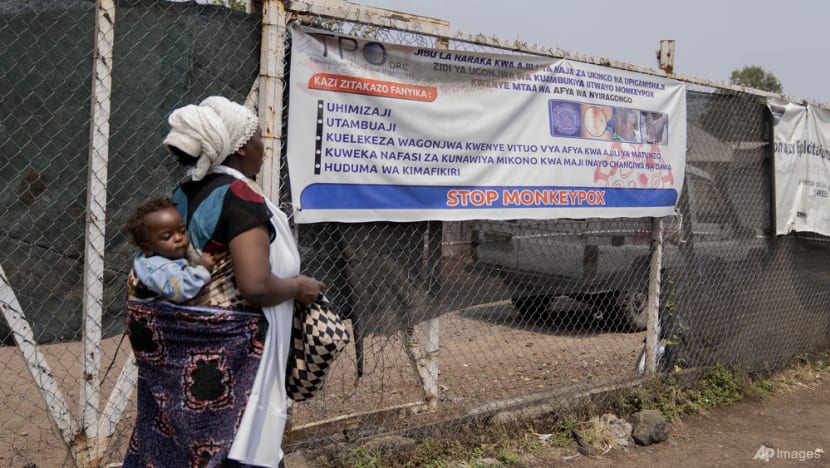Low immediate risk of mpox, but Singapore likely to see cases due to global connectivity: Ong Ye Kung
Mpox is expected to spread to Europe and the Middle East, and "probably Singapore will be one of the first places to find cases because of our flight connections", says the Health Minister.

A woman walks past a sign that reads stop mpox at a clinic in Munigi, eastern Congo on Aug 16, 2024. (Photo: AP/Moses Sawasawa)

This audio is generated by an AI tool.
SINGAPORE: The immediate risk of mpox to Singapore is low, but given the country's global flight connections, it is likely the virus, which is rapidly spreading in parts of Central and East Africa, will make its way here soon.
Speaking at an Employment and Employability Institute (e2i) event in Sembawang on Saturday (Aug 17), Health Minister Ong Ye Kung noted that the current risk is low as Singapore does not have any direct flights to and from the affected areas in Africa.
The situation, however, is "very worrying", said Mr Ong, adding that the infectious disease is expected to spread to Europe and the Middle East, and "probably Singapore will be one of the first places to find (mpox) cases because of our flight connections".
The surging mpox outbreak in Africa was declared an emergency by the World Health Organization (WHO) earlier this week and the European Centre for Disease Prevention and Control (ECDC) said on Friday said more imported cases to Europe were "highly likely".
The outbreak in the Democratic Republic of Congo began with the spread of an endemic strain, known as clade I. The strain has been reported in neighbouring countries and other African nations such as Uganda, Kenya, Tanzania and Angola.
A new variant, known as clade Ib, is also spreading and it appears to be more contagious through routine close contact, particularly among children. The Congo has recorded more than 15,600 potential cases and 548 deaths from mpox since the beginning of the year.
Sweden has reported the first case of clade Ib outside Africa, while Pakistan has also reported its first case of mpox and China has said it will start screening travellers for the virus.
Ten cases of mpox, formely known as monkeypox, were detected in Singapore as of Jul 27 this year, while there were 32 cases in 2023, with the Ministry of Health (MOH) confirming on Thursday that all cases in Singapore have been of the milder clade II strain.
The Health Ministry added the immediate public health risk to the country is low and that precautionary measures are in place.
SEVERAL KEY PARAMETERS
On the handling of mpox when it arrives, Mr Ong said there are several key parameters Singapore is taking into account.
"There are several strains, one major strain that we've been encountering that's called clade II. Clade II has a fairly low case fatality rate, about 0.2 per cent," he added, which means there are two deaths out of every 1,000 people who are infected.
"It is not very, very high compared to other endemic diseases that we've been dealing with."
Mr Ong, however, acknowledged that the clade I strain is the one that is spreading in Africa, with fatality rate around 3.5 per cent to 4 per cent, while the clade Ib variant is lower at 0.7 per cent.
"Of course, these are numbers recorded from Africa ... Africa has many healthcare challenges, and coming to Singapore, with our healthcare system and our ability to treat the cases, we hope we can bring it down significantly," he said.
Mr Ong noted children in Africa are not vaccinated against smallpox, which acts against mpox, so there are a "disproportionate number of children below 15" who are infected and succumb to the disease, and as such, this is "something we need to watch out for".
On clade II's low transmission rate, he said it was mostly among "people who are engaged in high-risk sexual activities".
While clade I has "gone beyond that" as it has spread to children, indicating close-contact transmission, there is "no evidence to show that it is spreading like Covid, where it can spread far and wide through airborne particles".
Related:
MONITORING "VERY CLOSELY"
Singapore's health authorities are monitoring the situation "very closely", with the minister adding that if mpox starts spreading to Europe and the Middle East, there may be increased surveillance at the borders to pick up infected passengers and do contact tracing as a "baseline".
In the meantime, Singaporeans should "live life normally", even as they are made aware of the mpox situation.
"Stay healthy, because if you are healthy, less likely you'll be affected by all these diseases," Mr Ong said.
"If you're unwell, you start having lesions, you know, like chicken pox type of rashes and chicken pox type of symptoms. Please isolate yourself. Inform, go see a doctor, inform the people close to you so that they can take medication."
MOH said on Thursday that Singapore’s healthcare system has the capability to effectively diagnose and manage mpox infections.
"We have informed all medical practitioners and healthcare institutions to be vigilant in detecting and reporting all mpox cases, including those suspected of clade I infections," the ministry said.
All travellers have also been required to report mpox-related symptoms like fever or rash, as well as their travel history, through the SG Arrival Card to facilitate the early detection of cases at Singapore's borders.
Suspected clade I cases will be isolated in hospitals. Close contacts of confirmed cases will be quarantined and monitored for up to 21 days from the date of last exposure, MOH added.













